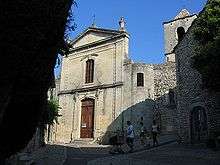William Chisholm (II)
| William Chisholm (II) | |
|---|---|
| Bishop of Dunblane | |
|
1580 statue of William Chisholm at Crestet | |
| Church | Roman Catholic Church |
| See | Diocese of Dunblane |
| In office | 1564–1569 |
| Predecessor | William Chisholm (I) |
| Successor | Andrew Graham |
| Personal details | |
| Born |
1525 x 1526 Scotland |
| Died |
26 September 1593 Rome, Italy |
| Previous post | Coadjutor of Dunblane (1561–1564) |

William Chisholm (called II in some biographies; died 1593), bishop of Dunblane and bishop of Vaison, was a son of Chisholm of Cromlix, and nephew to William Chisholm (I), bishop of Dunblane from 1527 to 1564, to whom he was appointed coadjutor by a brief of Pope Pius IV dated 1 June 1561.
Life
He is spoken of by John Knox as "one of the chief pillars of the Papisticall Kirk",[1] and in the very highest terms by the pope's legate, Nicolas de Gouda, in his despatch from the Scottish court in 1562. The legate, after commenting on the incapacity of the Scottish bishops generally, goes on to say: "The only exception is the coadjutor bishop of Dunblane; though holding but a secondary position during the lifetime of his superior, he has already made his influence felt, both in public and in private, having succeeded in confirming a great many people in the faith, and being justly held in high esteem and regard by all good men".[2]
This bishop was much employed by Mary, Queen of Scots, in diplomatic missions, of which the most important were in 1565 to Rome to obtain the pope's leave for her marriage with Darnley in spite of their consanguinity, and in 1567, when she sent him as special envoy to France to convey the intelligence of her marriage with Bothwell, and to explain the circumstances attending that event.[3]
He was also one of the commissioners for the divorce of Bothwell from Lady Jane Gordon, daughter of George Gordon, 4th Earl of Huntly. He is said to have still further dilapidated the income of his bishopric, and was declared to have forfeited it for non-compliance with the new arrangements after the fall of his royal mistress. In exile in Rome in January 1569, he was appointed as a priest at the Basilica di Santa Maria Maggiore by Carlo Borromeo.[4] On 3 July 1573 a license was issued by the four regents for the choice of successor as Bishop of Dunblane.[5]
Chisholm had before this retired to France, where he was well known, and in 1570 he was instituted by the pope to the bishopric of Vaison-la-Romaine, near Avignon, as some recompense for the loss of his position in Scotland and his exile. This bishopric, however, he resigned in 1584 in favour of his nephew, William Chisholm (III), when he retired to the convent of Grande Chartreuse. He took the vows only of a simple monk, but was soon made prior of the Chartreuse at Lyon, and eventually at Rome. He continued to busy himself greatly with Scottish affairs until his death at Rome on 26 September 1593, and is buried in the church of the Carthusians there. [5]
Notes
- Attribution
![]() This article incorporates text from a publication now in the public domain: Stephens, Henry Morse (1887). "Chisholm, William (d.1593)". In Stephen, Leslie. Dictionary of National Biography. 10. London: Smith, Elder & Co. p. 262.
This article incorporates text from a publication now in the public domain: Stephens, Henry Morse (1887). "Chisholm, William (d.1593)". In Stephen, Leslie. Dictionary of National Biography. 10. London: Smith, Elder & Co. p. 262.
References
- Dilworth, Mark. "Chisholm, William (1525/6–1593)". Oxford Dictionary of National Biography (online ed.). Oxford University Press. doi:10.1093/ref:odnb/5326. (Subscription or UK public library membership required.)
- Keith, Robert, An Historical Catalogue of the Scottish Bishops: Down to the Year 1688, (London, 1824), p. 180
- Forbes-Leith, William, Narratives of Scottish Catholics under Mary Stuart and James VI: now first printed from the original manuscripts in the secret archives of the Vatican and other collections, (Edinburgh, 1885), i. 935
- Stephens, H. M., "Chisholm, William II (d 1593), bishop of Dunblane and bishop of Vaison", Dictionary of National Biography, (Oxford, 1887)
| Religious titles | ||
|---|---|---|
| Preceded by William Chisholm (I) |
Bishop of Dunblane 1564–1569 |
Succeeded by Andrew Graham |